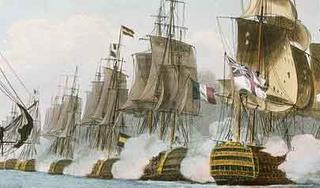1805: Battle of Trafalgar

In one of the most decisive battles in history, a British fleet under Admiral Horatio Nelson defeats a combined French and Spanish fleet at the Battle of Trafalgar, fought off the coast of Spain. At sea, Lord Nelson and the Royal Navy consistently thwarted Napoleon, who led France to preeminence on the European mainland. After the crushing defeat at Trafalgar, Napoleon was forced to abandon his plans for an invasion of England. At the height of the engagement on October 21, Nelson was mortally wounded while pacing the quarterdeck of the HMS Victory. He died a few hours later, and his body was solemnly brought back to England for burial. In London, a column was erected to his memory in the newly named Trafalgar Square.
1858The first performance of the dance, the 'Can Can' in Offenbach's 'Orpheus in the Underworld' in Paris.
1878Irish politician Charles Parnell becomes the first President of the newly-formed Irish National Land League.
1879American inventor Thomas Edison patents the electric light bulb.
1934In China, Communist leader Mao Tse Tung and 100,000 supporters begin their 12 month 'Long March' - a 6,000 mile trek from southern China where they are being persecuted, to the north of the country.
1950Chinese forces occupy the neighbouring country of Tibet.
1960Britain launches its first nuclear submarine - HMS Dreadnaught at Barrow.
1964The world film premiere of 'My Fair Lady'.
1966In Wales, more than 140 people - at least 114 of them children - are killed in the small mining village of Aberfan when tonnes of slush, from a nearby coal slag tip weakened by rain, slides downhill and engulfs the village school, a farm and a row of terraced houses.
1975The British unemployment figure reaches 1,000,000 for the first time since World War II.
1984Austrian Formula One Grand Prix driver Niki Lauda becomes world champion for the third time.
1985In one of Britain's worst motorway crashes, 13 people are killed on the M6 motorway in Lancashire.
1996In Britain, Frances Lawrence - widow of headmaster Phillip Lawrence who was stabbed to death by a group of teenagers outside his schoolgates - launches a 'better citizenship campaign' to promote good behaviour in schools.
1997'Candle in the Wind '97 ' - the re-working of the hit single Elton John sang live at the funeral of Diana, Princess of Wales, is declared the biggest selling single in music history.
1772English poet Samuel Taylor Coleridge is born in the village of Ottery St Mary in Devon. Among his famous poems: 'The Rhyme of the Ancient Mariner' and 'Kubla Khan'.
1833Swedish industrialist Alfred Nobel, the inventor of dynamite and founder of the 'Nobel' annual awards, is born in Stockholm. Dies in 1896.
1917American jazz trumpeter 'Dizzy' Gillespie - born John Birks in South Carolina. Becomes the leader of several big bands in America after World War II and leads a full orchestra on several international tours. Dies in 1993
1926English actor Leonard Rossiter. Becomes famous for playing comedy roles such as 'Mr Rigsby' and 'Reginald Perrin' on British TV during 1970s and 1980s
1940British musician Manfred Mann. During the 1960s his group records a string of succesful hit songs such as 'Do Wah Diddy-Diddy Dum, Diddy Do'; '5-4-3-2-1' and 'Pretty Flamingo'.
1940Yorkshire and England cricketer Geoff Boycott is born near Pontefract. Becomes one of the few cricketers in the world to score 100 Test centuries - completing his one hundreth century playing for England on his 'home' ground at Headingley in Leeds.
1805Admiral Horatio Nelson, fatally wounded on the HMS Victory, died only a few hours after the Battle of Trafalgar

0 Comments:
Post a Comment
<< Home